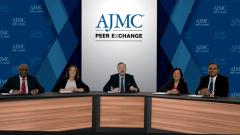
Strategies for Treating Preserved Ejection Fraction (HFpEF)
A key opinion leader provides insight into key HFpEF treatment strategies.
Episodes in this series

This is a video synopsis/summary of a panel discussion involving Robert Groves, MD; Eugene E. Wright Jr, MD; Nancy Albert, PhD; Nihar Desai, MD, MPH; and Kelly Marie Axsom, MD. The panel discusses sodium-glucose cotransporter-2 (SGLT2) inhibitor benefits in heart failure with preserved ejection fraction (HFpEF). Axsom notes the updated 2023 heart failure guidelines highlight SGLT2 inhibitors for HFpEF patients with hypertension. The PARAGON-HF trial for HFpEF patients showed reduced heart failure hospitalizations with sacubitril and valsartan versus valsartan, leading to FDA approval despite no improvement in the primary cardiovascular death outcome. Given the risks of hospitalization, keeping patients out of the hospital is crucial. Other trials like PARABLE and PARAGLIDE-HF also demonstrate left ventricle (LV) remodeling benefits with sacubitril-valsartan in early/symptomatic HFpEF. For HFpEF, Albert summarizes that along with managing comorbidities, the 2 pillars are SGLT2 inhibitors and sacubitril-valsartan based on level 1A and 2B guideline recommendations. Compared to the 2017 consensus statement, the 2022 statement provides more guidance on early screening with BNP (B-type natriuretic peptide) and echocardiogram, and highlights SGLT2 inhibitors and sacubitril-valsartan for HFpEF. However, optimization strategies are still lacking. Overall, SGLT2 inhibitors show clear benefits in both heart failure with reduced ejection fraction (HFrEF) and HFpEF populations, while sacubitril-valsartan is emerging as an important HFpEF therapy. These provide newer treatment options for the previously difficult-to-treat HFpEF population.
Video synopsis is AI-generated and reviewed by AJMC editorial staff.
Newsletter
Stay ahead of policy, cost, and value—subscribe to AJMC for expert insights at the intersection of clinical care and health economics.










